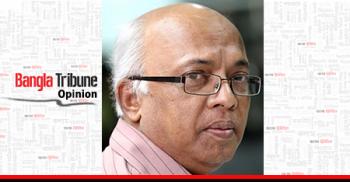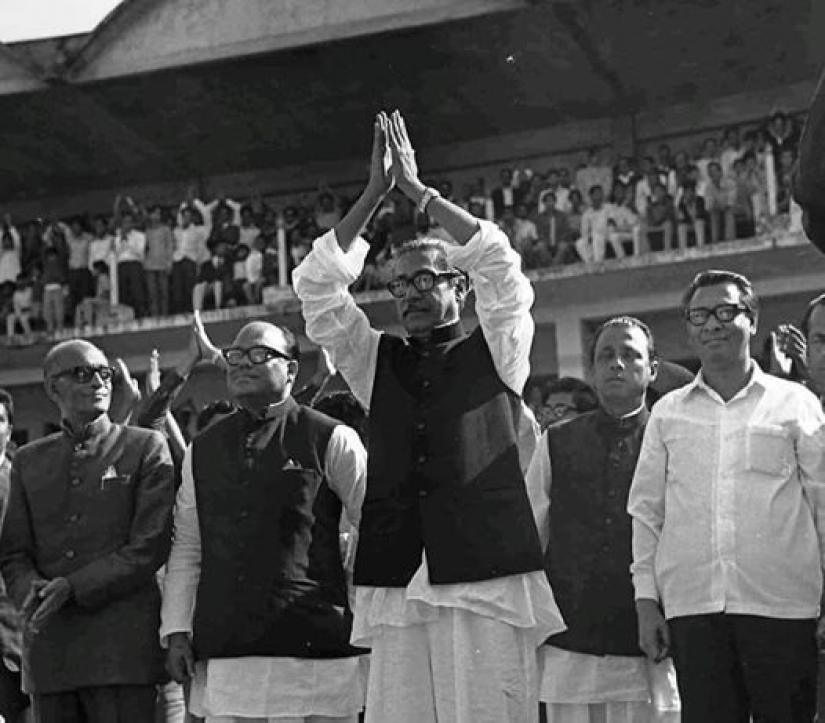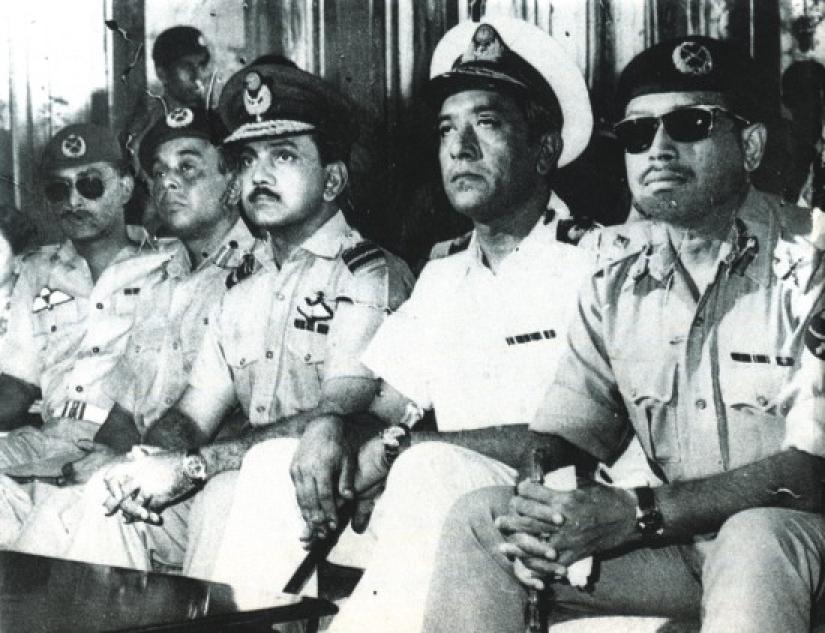 The stream of history set in motion in Bangladesh after Liberation in December 1971 has been a tortuous and painful one. You need to sit back and reflect on all the good men we have lost, all the values we have seen take flight even as we have prayed that things will get back on track at some point or the other. It is when you come to 1975 when you remember that annus horribilis, that you recoil from a recapitulation of what you have known.
The stream of history set in motion in Bangladesh after Liberation in December 1971 has been a tortuous and painful one. You need to sit back and reflect on all the good men we have lost, all the values we have seen take flight even as we have prayed that things will get back on track at some point or the other. It is when you come to 1975 when you remember that annus horribilis, that you recoil from a recapitulation of what you have known.
If to know is to suffer, then we as a people have known much and have suffered excessively. The assassination of the Father of the Nation, Bangabandhu Sheikh Mujibur Rahman, with nearly his entire family, was a rude shock that left us reeling in the weeks and months after 15 August 1975. Yes, of course, we had come through a series of coups d’etat, all of them in Pakistan. In a free Bangladesh, we looked forward to a political system where the old methods of forcing a government from office would be a tale of the past. It was not just a hope we nurtured. It was a belief we shared once Bangladesh emerged as a sovereign People’s Republic through a focused War of Liberation in 1971.
Bangabandhu’s murder put paid to that hope and that belief. The sadness was in the knowledge that a government based on popular sanction had been overthrown. The sadness took on an even more sinister hue when the overthrow of the government came through murder and mayhem.
We were young, trying to live through life in all the idealism we had seen sprout in our consciousness since the latter part of the 1960s. We had gone to war; and those who had been forced into internal exile in the occupied country in their own, diverse, silent ways contributed to an augmenting of the war effort. The Mujibnagar government was the repository of our loyalty. Our ideal was the incarcerated Bangabandhu. As November came round in 1975, it was with a sudden twist to the heart that we realised how poorly off we as a nation were with Bangabandhu dead and all the great men of the Mujibnagar government in prison. Darkness was once again part of collective national life, as it had once been in the year we fought off the Pakistanis.
 MURDER OF LIBERATION LEADERS
MURDER OF LIBERATION LEADERS
A day before the murder of the four national leaders in the putative security of prison, a senior Bengali journalist well-known for his pro-Pakistan stance in 1971 and at that point working for a foreign media organisation, disseminated the false news that a letter purporting to be from the Indian authorities and suggesting that the detained Tajuddin Ahmad, Syed Nazrul Islam, M. Mansoor Ali and AHM Quamruzzaman, all leading figures in the Mujibnagar government then in prison, be freed and so enabled to form a new government for Bangladesh. The implication, as sinister as it was baseless, was that foreign forces, in this case Indian, were in league with the jailed politicians.
In the early minutes of 3 November, all four politicians were gunned down in a cell inside Dhaka central jail by the very men who had in August murdered Bangabandhu Sheikh Mujibur Rahman and his family. Khaled Musharraf and his men clearly had little idea, even as they remained sorting out the mess of a power struggle at Bangabhaban, that tragedy had already occurred at Dhaka jail.
On the morning of 4 November, Korban Ali, minister for information in Bangabandhu’s government and just released from prison, told a crowd before his Wari home of the jail tragedy that had occurred just hours earlier. A short while later, a young man was noted telling individuals at the mausoleum housing the remains of Sher-e-Bangla AK Fazlul Huq, Huseyn Shaheed Suhrawardy and Khwaja Nazimuddin that the four leaders killed inside Dhaka central jail had to be buried inside the same compound.
SAYEM TAKES OVER
Between 4 and 6 November a flurry of announcements and statements made by the president were aired over the radio. The queer part of the story was that no one exactly knew who the president was. The popularly held belief was that Moshtaque had been ousted by Brigadier Khaled Musharraf. But if that was true, who had replaced him? No one knew. Meanwhile, fresh rumours began to make their rounds, all reinforcing the thought that for all his triumph in securing the departure of the assassins for Bangkok, Musharraf was really on shaky ground. Rumblings of discontent were gaining in intensity inside Dhaka cantonment and elsewhere. Soldiers unhappy with Musharraf were organising themselves, through the active involvement of Colonel Taher, in a plot to overthrow Musharraf, who had meanwhile been appointed chief of staff of the army in succession to the detained Ziaur Rahman.
As the country teetered on uncertainty, 6 November dawned with newspaper images of a beaming Khaled Musharraf being decorated with epaulettes reflecting his new rank of major general by the chief of staff of the navy, Rear Admiral MH Khan, and the chief of staff of the air force, Air Vice Marshal MG Tawab. The latter had been flown in from Germany, where he had been leading a retired life, to take over from AK Khondokar in the period following 15 August.
As the day progressed on 6 November, the pieces began to fall into a pattern. The announcement that Khondokar Moshtaque Ahmed had resigned the presidency was swiftly followed by news that the chief justice of the Supreme Court, Abu Sadat Muhammad Sayem, had replaced him. A new order appeared to be in place finally. In the late afternoon, President Sayem’s motorcade was observed passing through Bijoynagar. He was cheered by many bystanders. A number of young men went into animated discussions of how the Musharraf triumph would soon lead the country back to normality. The new president addressed the nation late in the evening and specifically condemned the killings of the national leaders in August and November.
 DEATH OF A GENERAL
DEATH OF A GENERAL
As the night deepened, rumours of an unsavoury kind began to make the rounds. General Khaled Musharraf, they appeared to suggest, was waging a desperate struggle to hold on to his authority against the army units now beginning to move against him. In the cantonment, slogans of a ‘sepoy-janata’ revolution were raised. The entire area began to resonate with them. A full-scale rebellion was on and for once the shrewd, brilliant Khaled Musharraf appeared unable to resist the tide against him and his loyalists.
As 7 November dawned, Dhaka slipped into the hands of Colonel Taher and his men, who lost little time in freeing General Ziaur Rahman from confinement and restoring him to authority as chief of staff of the army. For General Musharraf, conditions had already gone from bizarre to eerie. He and his loyalists were on the run from the marauding men who had clearly thrown in their lot with Taher and Zia. Attempting to make their way out of Dhaka in the hope of organising resistance, Musharraf, Huda and Haider found themselves in Sher-e-Banglanagar. Within minutes they became prisoners of the men they had once commanded. All three were brutally murdered. Their corpses were then subjected to varied forms of humiliation.
Sometime in the early afternoon, General Zia made his way to Bangabhaban. Soldiers and a crowd of onlookers raised, for the first time in independent Bangladesh, the slogan of Nara-e-Takbeer, punctuated of course by another, Sepoy-Janata Zindabad. The nation’s secular ethos was in grave peril.
As twilight descended on the country on 7 November 1975, all hope, raised briefly only days earlier, of a revival of the spirit that had led Bengalis into the War of Liberation in 1971 seemed to have been snuffed out. Musharraf loyalists in the army, those who had survived death, were scattered and making their way to safety.
Moshtaque and his cabal were out, sure. But those who commandeered the state after Khaled Musharraf’s murder appeared to promise to prolong the nightmare that had been inaugurated on 15 August.
Syed Badrul Ahsan is the author of biographies of Bangabandhu Sheikh Mujibur Rahman and Tajuddin Ahmad and writes on politics and diplomacy.


